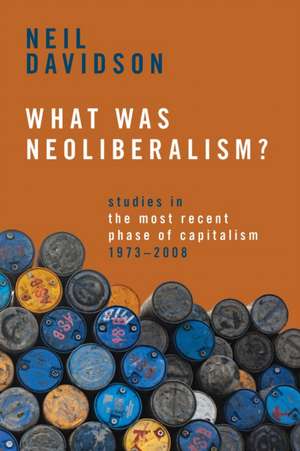What Was Neoliberalism?
Autor Neil Davidsonen Limba Engleză Hardback – 14 noi 2023
| Toate formatele și edițiile | Preț | Express |
|---|---|---|
| Paperback (1) | 127.42 lei 3-5 săpt. | +18.60 lei 6-10 zile |
| Haymarket Books – 14 noi 2023 | 127.42 lei 3-5 săpt. | +18.60 lei 6-10 zile |
| Hardback (1) | 378.06 lei 6-8 săpt. | |
| Haymarket Books – 14 noi 2023 | 378.06 lei 6-8 săpt. |
Preț: 378.06 lei
Nou
Puncte Express: 567
Preț estimativ în valută:
72.34€ • 78.83$ • 60.96£
72.34€ • 78.83$ • 60.96£
Carte tipărită la comandă
Livrare economică 23 aprilie-07 mai
Preluare comenzi: 021 569.72.76
Specificații
ISBN-13: 9781642599565
ISBN-10: 1642599565
Pagini: 270
Dimensiuni: 152 x 229 x 16 mm
Greutate: 0.53 kg
Editura: Haymarket Books
ISBN-10: 1642599565
Pagini: 270
Dimensiuni: 152 x 229 x 16 mm
Greutate: 0.53 kg
Editura: Haymarket Books
Notă biografică
Neil Davidson (1957-2020) lectured in Sociology at the School of Social and Political Science at the University of Glasgow. He authored The Origins of Scottish Nationhood (2000), Discovering the Scottish Revolution (2003), for which he was awarded the Deutscher Memorial Prize, How Revolutionary Were the Bourgeois Revolutions? (2012), Holding Fast to an Image of the Past (2014) and We Cannot Escape History (2015). Davidson was on the editorial boards of rs21 and the Scottish Left Project website, and was a member of the Radical Independence Campaign.
Cuprins
Preface
Introduction
History
Chapter 1: Intellectual antecedents and material origins
Chapter 2: Vanguard neoliberalism: regimes of reorientation, 1973-1991
Chapter 3: Social neoliberalism: regimes of consolidation, 1992-2007
Structure
Chapter 4: Boom economies?
Chapter 5: Broken societies?
Chapter 6: Market states?
Conclusion: A new phase of capitalist development or a "Third Period" of neoliberalism?
Introduction
History
Chapter 1: Intellectual antecedents and material origins
Chapter 2: Vanguard neoliberalism: regimes of reorientation, 1973-1991
Chapter 3: Social neoliberalism: regimes of consolidation, 1992-2007
Structure
Chapter 4: Boom economies?
Chapter 5: Broken societies?
Chapter 6: Market states?
Conclusion: A new phase of capitalist development or a "Third Period" of neoliberalism?
